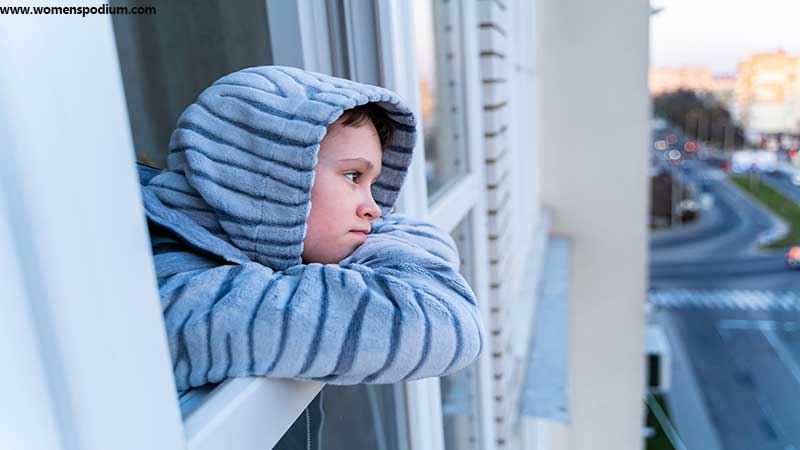
Parenting is similar to a long extensive endless journey where one grows and matures with time, age, information, and experience. As a parent, you are your children’s constant companion as your child crosses the hurdles of time and tide. You not only gain new insights into the prospect of his growth and development but also enhance your experience regarding the chiseled cuts of parenting. Well, it is good to be a constant guide and companion, but as parents, you should also provide your kids with some space, freedom, and standing time. Just think of the proposition of leaving your kids home alone.
Ask Yourself Some Questions on Leaving Your Child Home Alone

Before leaving your child on his own at home, you first have to answer these questions honestly, as it will help you understand your child much better before you start him leaving alone. Besides, you can train him well with everything he needs to know to manage on his own when the time comes. It’s also important to consider how your child handles various wanted or unwanted situations. Here are a few questions you need to think about sincerely.
- Does your child know all the basic life skills of his age?
- Is he sincere and sensitive enough to understand the meaning of staying home alone?
- Does your child show responsibility for homework, household chores, and other work?
- Is your child disciplined and understands and follows the rules?
- Can your child apprehend and obey your guidance and follow safety measures?
- How does your child react and handle unexpected situations? Does he maintain calmness and composure or panic?
- Does your child understands good and evil act and have good judgmental skills?
- Can he perform the basic first-aid training on his own?
- Does your child obey your instructions about staying away from strangers?
Time and Guidance Matters

Being a parent, for you, it is practically impossible to have him dragged everywhere. Ultimately, sometimes or the other, you ought to leave your child alone at home. Then, you must wonder what the exact age threshold for exercising that choice is. Today we will discuss when your child can leave at home alone without much worrying; the basic is to give them some training. Just go through the following points.
1. Talking Solves Many Problems

As we know, communication is the key to many problems; if you have miscommunication or no communication within your family, trust me, you will suffer the most. Because no appropriate communication gives birth to misunderstandings and differences, so be sure to speak your heart and clear your doubts and misapprehensions at the right time to avoid losing your dear ones. And when it comes to your child, it is a must. If you consider the opinion of experts and psychologists, most children below the age of ten are not mature enough to be left alone. So first try to follow this, go for a nanny or babysitter or call your friends and parents to support you in managing your kid, but if you have a certain scenario where you have to leave your child home alone, you need to have a straight-talking time with your kids. Just try to ensure that he is grown up enough to understand the implications of being left alone.
2. Every Child is Different

In general, leaving kids younger than ten years old at home alone is not a good idea. However, your viewpoint may differ about the standardized cut of age. That’s because concepts such as age, development, and biological and emotional maturity vary from one to another. Realistically speaking, this can be case-specific rather than generic. If your child is sensible and understanding, you might take a chance of leaving him home alone for one or two hours. Still, I would suggest if your child is below 9 years or 10 years old, it’s better to avoid leaving him on his own.
3. Take Some Tests or Go for Some Practice

Rather than banking on the age threshold, having an intimate conversation is important. You need to ascertain your child’s comfort level, whether he is at all comfortable with the idea of being left home alone. His comfort zone ought to be prioritized over other miscellaneous issues. However, it is good if you try taking some tests as fun and see how your child is taking all this adventure. For this, you simply have to stay in your bedroom and tell your child to manage alone, assuming his parents are not at home; let’s see how he takes it.
4. Teach Basic Life Skills

Dependability is another factor worth pondering over. As a parent, you ought to know if your child is responsible for his day-to-day chores. Train your child with basic life skills at the right age. His commitment to following orders and assigned home tasks is another point of consideration. It is always easier to leave a disciplined child all by himself rather than one who is not.
5. No Emotional Baggage

There is little or no point in adding to his emotional baggage of fear and insecurity. Some children are unnecessarily fearful about the idea of staying home alone; thus, you need to consider that as well. The situational safety of the place you live and the generic reliability of your neighborhood are the other leading factors of consideration. So if your child says no, then don’t force; always ensure to make him stay with someone older to look after them. Before leaving them alone to themselves, it is crucial to consider the safety proposition of your household precinct, as well.
Consider These Before You Leave
After all those brainstorming, training, and discussions, when you are determined that your child is ready to stay home alone, try these practical steps to make the process easier for you both.
1. Stay in Touch

Although you have trained him well, never forget that he is still a child, so set up a schedule for staying in touch via phone calls or video calls. You can call your child immediately after school or fix a few hours when you will call home to check his whereabouts. Let your child understand your situations as well, such as your availability and when you might not be able to answer his calls. Make a list of your family members, grandparents, close relatives, and friends so that in case he can’t reach you, he can call these trusted people.
2. Keeps Essentials Handy

Ensure to stock everyday goods, emergency supplies, and healthy food for snacking. Paste or stick important phone numbers of family members, close friends, family doctors, and emergency helplines such as fire department and police on the soft board your child might need in a crisis.
3. Childproof your Home

No matter how pleasingly your child observes and obeys the rules, he is still a child; that’s why it is a must to secure anything that could be a health or safety risk. Keep car keys, lighters, medicines, alcohol, and other prescription drugs out of their sight. Besides these, if you have a gun, ensure it is locked up and unloaded.
4. Set Some Ground Rules

Ground rules are a must because they help follow discipline rightly, however, this process ensures to avoid certain discipline errors which can take things south. So, when you’re away from home, establish the below-shared rules and ensure your child knows and understands them.
- Answering your calls timely and avoiding the wrong numbers or talking to strangers.
- Calling his friends at home while you’re not there.
- Not to open the door to strangers.
- Fix screen time, either watching TV or playing games.
- Rules on using computers and the internet.
- No visit to the rooms of the house that are off-limits, especially with friends.
- How to live with siblings without any arguments.
- Last but not least is not to tell anyone about his whereabouts, especially when your child is home alone.

Leaving your child home alone is a difficult decision where you have to think quite carefully and simultaneously discuss it with your child and ask his opinion because everything depends on how your child takes it, not you. Certain states and regions are marked by the presence of legal guidelines. There is a legal threshold guiding the age bar – the minimum limit wherein you can leave him home alone. Whereas most regions are not driven by such legal standards, here you must consider the circumstantial factors and other associated factors of maturity.
Also Read: Avoid parenting mistakes and must know about safe circle regarding child safety, online safety, and sexual abuse prevention.





